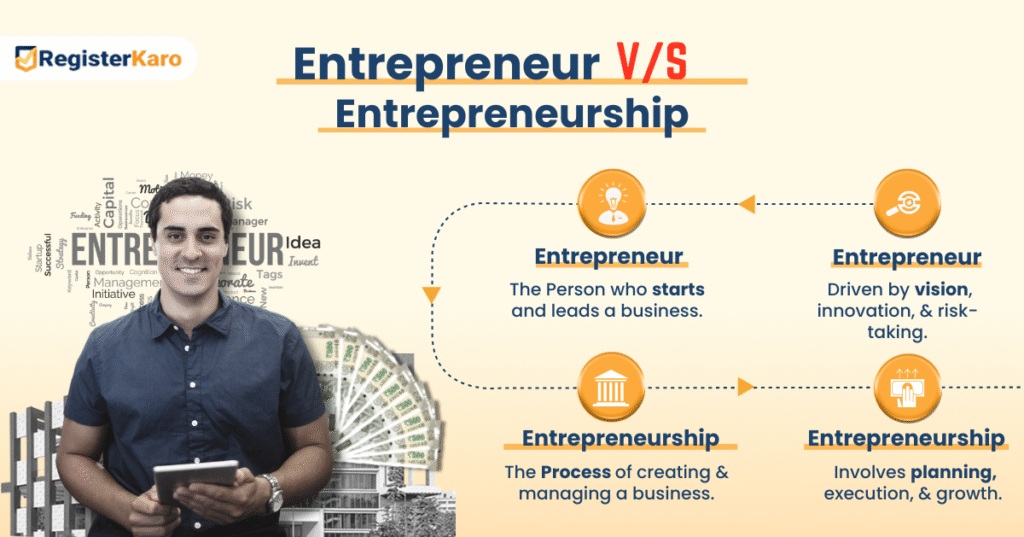
Did you know? India is home to over 61,000 startups, making it the third-largest startup ecosystem in the world.
However, many aspiring business owners still confuse the terms “entrepreneur” and “entrepreneurship.” Understanding the difference between an entrepreneur and entrepreneurship is crucial for anyone looking to enter the business world.
While an entrepreneur is the person who starts and runs a business, entrepreneurship refers to the entire process of creating and managing that business venture.
What is an Entrepreneur?
An entrepreneur is simply a person who identifies opportunities and creates businesses to solve problems. They are the driving force behind innovation and economic growth. Think of entrepreneurs as problem-solvers who turn ideas into profitable ventures.
Every successful entrepreneur possesses certain qualities. They take calculated risks, show leadership, and demonstrate creativity in their approach. Moreover, entrepreneurs are willing to invest their time, money, and effort into building something new.
Are you hoping to start your entrepreneurial journey?
You can use RegisterKaro to register your business without hassle.
What is Entrepreneurship?
Entrepreneurship is the process of starting and running a business. It encompasses all activities involved in creating, developing, and managing a business venture. It includes identifying opportunities, gathering resources, and building sustainable business models.
The concept of entrepreneurship and entrepreneur go hand in hand. While the entrepreneur is the person, entrepreneurship is the action they take. Additionally, entrepreneurship involves risk-taking, innovation, and value creation for society.
Key Differences Between an Entrepreneur and Entrepreneurship

| Aspect | Entrepreneur | Entrepreneurship |
| Definition | A person who identifies opportunities and creates businesses to solve problems | The complete process of starting, developing, and managing a business venture |
| Nature | Individual/Personal trait | Process/Activity-based |
| Scope | Limited to personal qualities and capabilities | Broader encompassing all business activities |
| Focus | Vision, leadership, and individual skills | Systems, operations, and systematic processes |
| Duration | Lifetime personal characteristic | Ongoing cyclical process |
| Measurement | Assessed by qualities, skills, and personal attributes | Measured by results, outcomes, and business performance |
| Risk Factor | Personal risk-taking ability and willingness | Systematic risk management and mitigation strategies |
| Role | The driving force and decision-maker | The framework and methodology for business creation |
| Characteristics | – Risk-taking ability- Innovation mindset- Leadership qualities- Vision and creativity- Persistence | – Process-oriented approach- Resource mobilization- Value creation focus- Systematic planning- Market-driven strategies |
| Examples | – Mukesh Ambani (Reliance)- Kiran Mazumdar-Shaw (Biocon)- Ritesh Agarwal (OYO)- Vijay Shekhar Sharma (Paytm) | – Building Reliance from textile to conglomerate- Creating Biocon from garage startup to global company- Developing OYO’s hospitality ecosystem- Establishing Paytm’s fintech platform |
| Skills Required | – Communication skills- Financial literacy- Problem-solving abilities- Adaptability- Persistence | – Market research- Business planning- Resource allocation- Operations management- Strategic implementation |
| Key Activities | – Identifying opportunities- Making strategic decisions- Leading teams- Taking calculated risks- Inspiring innovation | – Idea generation and validation- Feasibility analysis- Business planning- Resource mobilization- Implementation and scaling |
| Outcome | Creates the foundation for business success through personal leadership | Delivers measurable business results and sustainable growth |
| Relationship | The “WHO” behind the business venture | The “HOW” of creating and running the business |
| Development | Involves personal growth, skill enhancement, and mindset development | Involves systematic learning of business processes and methodologies |
| Impact | Influences through personal vision and leadership style | Creates value through structured business operations and market solutions |
Characteristics of an Entrepreneur and Entrepreneurship
| Entrepreneur Characteristics | Entrepreneurship Characteristics |
| Risk-taking ability | Process-oriented |
| Entrepreneurs willingly take calculated risks to achieve their goals. | Entrepreneurship follows systematic steps from idea generation to business establishment. |
| Innovation mindset | Resource mobilization |
| They constantly seek new ways to solve existing problems. | It involves gathering financial, human, and material resources efficiently. |
| Leadership qualities | Value creation |
| Successful entrepreneurs inspire and guide their teams effectively. | Entrepreneurship focuses on creating value for customers and society. |
How Entrepreneur and Entrepreneurship Work Together?
In practical terms, let’s consider how entrepreneurs and entrepreneurship work together. When Ritesh Agarwal founded OYO Rooms, he acted as an entrepreneur. However, the entire journey from identifying the problem to building a hospitality empire represents entrepreneurship.
Similarly, when someone starts a local restaurant, they become an entrepreneur. But the process of market research, menu planning, staff hiring, and daily operations constitutes entrepreneurship.
Looking to register your startup? RegisterKaro makes business registration simple and affordable for Indian entrepreneurs.
Concept of Entrepreneur and Entrepreneurship in Modern India
In modern India, the meaning of entrepreneur and entrepreneurship has changed a great deal. Current entrepreneurs depend on technology, help from the government, and access to global markets to build businesses that grow. Programs like Startup India and Make in India have further encouraged entrepreneurial activities.
Digital entrepreneurs like Vijay Shekhar Sharma (Paytm) and Bhavish Aggarwal (Ola) represent the new generation. They understood market needs and built solutions using technology. Their entrepreneurial journey demonstrates how between entrepreneur and entrepreneurship, there’s a symbiotic relationship.
Furthermore, the rise of unicorn startups shows how entrepreneurship has become more systematic. These companies follow structured approaches to growth, funding, and market expansion.
Essential Skills for Entrepreneurs
- Communication Skills: Entrepreneurs must learn how to effectively communicate with customers, investors, and team members to build strong relationships and convey their vision clearly.
- Financial Management: Gaining financial knowledge is crucial for managing money wisely, making informed investment decisions, and maintaining healthy cash flow for the business.
- Problem-Solving Abilities: Daily challenges require entrepreneurs to develop strong analytical and creative problem-solving skills to overcome obstacles and find innovative solutions.
- Adaptability: The ability to adjust to changes in the industry, market conditions, and customer demands is essential for long-term business survival and growth.
- Persistence and Resilience: This is the most important skill that allows entrepreneurs to recover from failures, learn from disappointments, and maintain motivation despite setbacks.
Are you in need of advice on business compliance issues? On RegisterKaro, you can find full legal and compliance support.
What is The Entrepreneurship Process?
Understanding what an entrepreneur is and entrepreneurship requires knowing the entrepreneurship process. This process typically involves five key stages that every entrepreneur must navigate.
1. Idea Generation and Opportunity Recognition
At the start, people should determine what issues should be resolved. Entrepreneurs watch for needs that aren’t being met in the market and issues customers face. Afterward, they come up with ideas that might solve these challenges.
2. Feasibility Analysis
After that, entrepreneurs check if their ideas are workable. They check market trends, evaluate competitors, and list the resources needed. This phase is meant to find out if the business concept can achieve positive results.
3. Business Planning
Subsequently, entrepreneurs create detailed business plans. These plans outline strategies, financial projections, and operational procedures. A well-crafted business plan serves as a roadmap for the venture.
Planning to start your business? RegisterKaro can help you create a solid foundation with proper business registration and compliance.
4. Resource Mobilization
Then, entrepreneurs gather necessary resources, including funding, talent, and equipment. They may seek investors, apply for loans, or bootstrap their ventures. Resource mobilization is crucial for business launch and growth.
5. Implementation and Growth
At last, entrepreneurs set their plans in motion and focus on making their businesses grow. They watch the company’s results, change their strategies when needed, and seek new growth chances. Building a business in this way is a key factor behind successful entrepreneurship.
Challenges in Entrepreneurship
At the same time, becoming an entrepreneur opens doors, but it also comes with major challenges. Limited financial resources tend to stop a business from growing and expanding. To succeed in the market, companies must constantly invent new things and be unique.
Besides, complying with regulations can be difficult for those who are just beginning in business. Handling the workforce and developing good teams is also challenging. Trying to manage personal life and business tasks is particularly tough in the early days of a business.
Still, understanding what an entrepreneur is and what entrepreneurship involves helps when addressing these challenges. Resilience can be built by entrepreneurs, and entrepreneurship supplies useful methods for problem-solving.
Role of Technology in Modern Entrepreneurship
- Global Market Access: Technology platforms enable entrepreneurs to share their products worldwide without significant financial investment, breaking down geographical barriers and expanding market reach.
- New Business Models: E-commerce platforms, social media networks, and mobile applications have created opportunities for entirely new types of businesses and innovative entrepreneurial ventures.
- Operational Efficiency: Artificial intelligence and automation help entrepreneurs improve company operations, streamline processes, and control expenses through enhanced productivity and reduced manual work.
- Scalable Infrastructure: Cloud computing allows entrepreneurs to access unlimited resources on demand without major upfront financial investments, enabling businesses to scale efficiently as they grow.
- Simplified Financial Management: Fintech solutions make payment processing and financial administration much simpler, providing entrepreneurs with user-friendly tools for managing transactions and business finances.
Government Support for Entrepreneurs
The Indian government has introduced various schemes to promote entrepreneurship. The Startup India initiative provides funding, mentorship, and regulatory support to new ventures. MUDRA loans offer financial assistance to micro and small enterprises.
Stand-up India focuses on supporting women and SC/ST entrepreneurs. Additionally, incubation centers and innovation hubs provide infrastructure and guidance. These initiatives demonstrate the government’s commitment to fostering entrepreneurial growth.
All in all, entrepreneurship and entrepreneurs are linked but still have differences. An entrepreneur is the person who spots chances and acts on them. Entrepreneurship is all about planning and running different business ventures.
Those aiming to start a business need to understand the difference. It teaches you how to think, learn the key skills, and work using established methods. Furthermore, this information helps leaders choose better options and enjoy more chances of business success.
Entrepreneurship in India is an ongoing area that is ongoing and always getting better. Proper knowledge of entrepreneurs and entrepreneurship allows aspiring business owners to be useful in driving development. Just starting as an entrepreneur is only the start; truly mastering it takes a lifetime.
Launching your business has never been easier – RegisterKaro is at your service for business registration, strict compliance, and ambitious growth in India.
Frequently Asked Questions (FAQs)
1. What is the main difference between an entrepreneur and entrepreneurship?
An entrepreneur is a person who starts and runs a business, while entrepreneurship is the complete process of creating, developing, and managing that business venture.
2. Can anyone become an entrepreneur?
Yes, anyone with the right mindset, skills, and determination can become an entrepreneur. However, success requires dedication, learning, and continuous improvement.
3. What skills do entrepreneurs need?
Entrepreneurs need communication skills, leadership abilities, financial literacy, problem-solving capabilities, and adaptability to succeed in business.
4. How does entrepreneurship benefit society?
Entrepreneurship creates jobs, drives innovation, promotes economic growth, and provides solutions to social problems, benefiting society overall.
5. What are the types of entrepreneurship?
Main types include small business entrepreneurship, scalable startup entrepreneurship, social entrepreneurship, and corporate entrepreneurship.
6. How important is business planning in entrepreneurship?
Business planning is crucial as it provides direction, helps secure funding, identifies potential challenges, and serves as a roadmap for success.
7. What role does risk-taking play in entrepreneurship?
Risk-taking is fundamental to entrepreneurship as it involves investing time, money, and effort with uncertain outcomes, but calculated risks lead to rewards.
8. How has technology changed entrepreneurship?
Technology has democratized entrepreneurship by reducing barriers to entry, enabling global reach, improving efficiency, and creating new business models.
9. What government support is available for Indian entrepreneurs?
The government offers schemes like Startup India, MUDRA loans, Stand-up India, and various incubation programs to support entrepreneurs.
10. How can I start my entrepreneurial journey?
Begin by identifying opportunities, developing necessary skills, creating a business plan, securing resources, and taking the first step with proper business registration.




